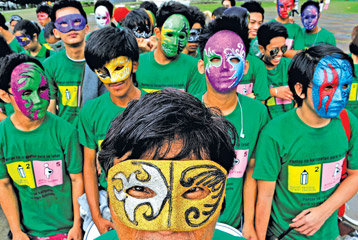Greater protection for indigenous communities
UN Secretary-General Ban Ki-moon urged the world to step up efforts
to improve living conditions of the planet’s indigenous communities and
to protect them, saying they continued to suffer discrimination and
poverty despite a United Nations declaration that aims to promote their
rights.
“Indigenous peoples still experience racism, poor health and
disproportionate poverty,” Ban said in a message to mark the
International Day of the World’s Indigenous Peoples. “In many societies,
their languages, religions and cultural traditions are stigmatized and
shunned,” the Secretary-General added.
He pointed out that the first-ever UN report on the State of the
World’s Indigenous Peoples in January this year came up with alarming
statistics.
|

Nepalese men and women from the Magar ethnic community dance
during a rally in Kathmandu to mark International Day of the
World’s Indigenous People on August 9, 2010. |

Members of global rights group Amnesty International lead
hundreds of other activists wear colourful masks in a march to
celebrate the 16th International Day of the World’s Indigenous
Peoples, in Manila on August 8, 2010. |
In some countries, indigenous people are 600 times more likely to
contract tuberculosis than the general population. In others, an
indigenous child can expect to die 20 years before his or her
non-indigenous compatriots.
Ban said that the landmark UN Declaration on the Rights of Indigenous
Peoples, adopted by the General Assembly in 2007, laid out a framework
for Governments to use in strengthening relationships with indigenous
peoples and protecting their human rights.
“Since then, we have seen more Governments working to redress social
and economic injustices, through legislation and other means, and
indigenous peoples’ issues have become more prominent on the
international agenda than ever before,” Ban added.
In her statement, the UN High Commissioner for Human Rights, Navi
Pillay, stressed that the gap between the principles of the declaration
and the reality remains wide, with indigenous peoples continuing to
suffer discrimination, marginalization in health and education, extreme
poverty, disregard for their environmental concerns, displacement from
their traditional lands and exclusion from participation in
decision-making processes.
“It is particularly disconcerting that those who work to correct
these wrongs are, all too often, persecuted for their human rights
advocacy,” she said.
Pillay, however, pointed out that, “We have cause to celebrate the
progress made in turning human rights into a reality for indigenous
peoples, but this International Day of the World’s Indigenous Peoples is
also an occasion to recall that there is no room for complacency.”
The focus of this year’s International Day is indigenous filmmakers,
who have given the world insights into their communities, cultures and
history.
The filmmakers have chronicled the belief systems and philosophies of
indigenous communities, as well as their daily lives.
The UN independent expert on the rights and fundamental freedoms of
indigenous peoples, James Anaya, said the communities continued to
endure oppression.
“Indigenous peoples continue to see their traditional lands invaded
by powerful actors seeking wealth at their expense, thereby depriving
them of life-sustaining resources,” said Anaya, the Special Rapporteur
on the situation of the human rights and fundamental freedoms of
indigenous peoples.
He called for the implementation of the Declaration by Governments,
the UN system and other concerned authorities.
States, he added, should engage in comprehensive reviews of their
existing legislation and administrative programmes to identify where
they may be incompatible with the Declaration.
The Secretary-General noted that the world’s indigenous peoples were
responsible for the preservation of vast amounts of humanity’s cultural
history, and spoke a majority of the world’s languages. They had also
inherited and passed on a wealth of knowledge, artistic forms and
religious and cultural traditions.
“As we celebrate these contributions, I call on Governments and civil
society to fulfil their commitment to advancing the status of indigenous
peoples everywhere,” the Secretary-General said.
Pillay said she was encouraged by the fact that in a number of
countries, new tools have been created to give voice to indigenous
peoples in decision-making and to stamp out human rights violations.
“We are also encouraged by the fact that support for the declaration
keeps expanding, including in the countries that originally voted
against this remarkable document,” she added.
“We need to bring the rights and dignity of those who are suffering
most to the centre of our efforts.
This requires changes in practices, but we also need improved laws
and institutions, without which advances are not sustainable.
“On this International Day, let us reaffirm our commitment to
translate the words of the declaration into effective action. Keeping
this promise is our obligation,” Pillay said. The Executive Director of
the UN Children’s Fund (UNICEF), Anthony Lake, highlighted the
disparities in the welfare and health of children born into indigenous
communities compared to other children.
UN News |



